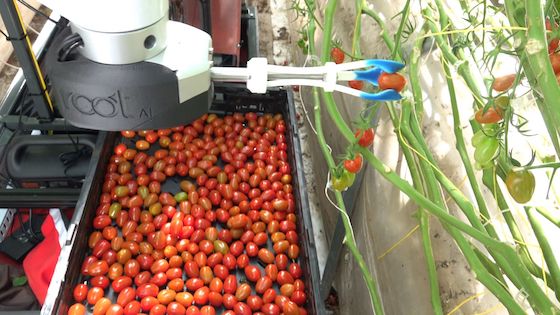Do you still think of picking fruits and vegetables as an occupation that requires migrant workers to do the hard work? That industry, along with many others, is being transformed by the introduction of smart machines.
The latest in pickers can now detect degrees of ripeness to suit the market — more ripe for local and less so for distant markets where shipping is needed.
Below, the Virgo robot chooses which tomatoes to be harvested, then picks them.

In case anyone in Washington is paying attention, the increased use of robot pickers means even fewer low-skilled migrants are needed to work the crops. In a few years, when machines are cheaper than workers, the vegetable field may become the agricultural equivalent of modern automotive manufacturing — a workplace devoid of humans.
Remember that automation, robots and artificial intelligence are about to change the workplace fundamentally, but our political leaders remain on snooze mode about the threat to the economy.
This robot can pick tomatoes without bruising them and detect ripeness better than humans, CNBC, May 11, 2019
Farmers spend more than $34 billion a year on labor in the U.S., according to the USDA. And many would like to hire more help. But the agriculture industry here faces labor shortages, thanks in part to the scarcity of H2B visas, and an aging worker population. Older workers can’t necessarily handle the hours or repetitive physical tasks they once might have.
That’s where Root AI, a start-up in Somerville, Massachusetts, comes in. The company’s first agricultural robot, dubbed the Virgo 1, can pick tomatoes without bruising them, and detect ripeness better than humans.
The Virgo is a self-driving robot with sensors and cameras that serve as its eyes. Because it also has lights on board, it can navigate large commercial greenhouses any hour of the day or night, detecting which tomatoes are ripe enough to harvest. A “system-on-module” runs the Virgo’s AI-software brain. A robotic arm, with a dexterous hand attached, moves gently enough to work alongside people, and can independently pick tomatoes without tearing down vines.
The robot’s “fingers” are made of a food-safe plastic that’s about as flexible as a credit card, and easily cleaned. Josh Lessing, founder and CEO of Root AI, says that easy-to-clean trait is important.
“People don’t think about this — you have to manage disease on a farm. Just as if I picked with my own hands, there’s a risk of spreading around mold, viruses or insects with a robot. That’s why you want these to be washable. It is part of the work you do to keep the plants safe.”
One of the most unique things about the Virgo, he notes, is that the company can write new AI software and add additional sensors or grippers to handle different crops. “It’s a complete mobile platform enabled to harvest whatever you need,” says Lessing. (Continues)